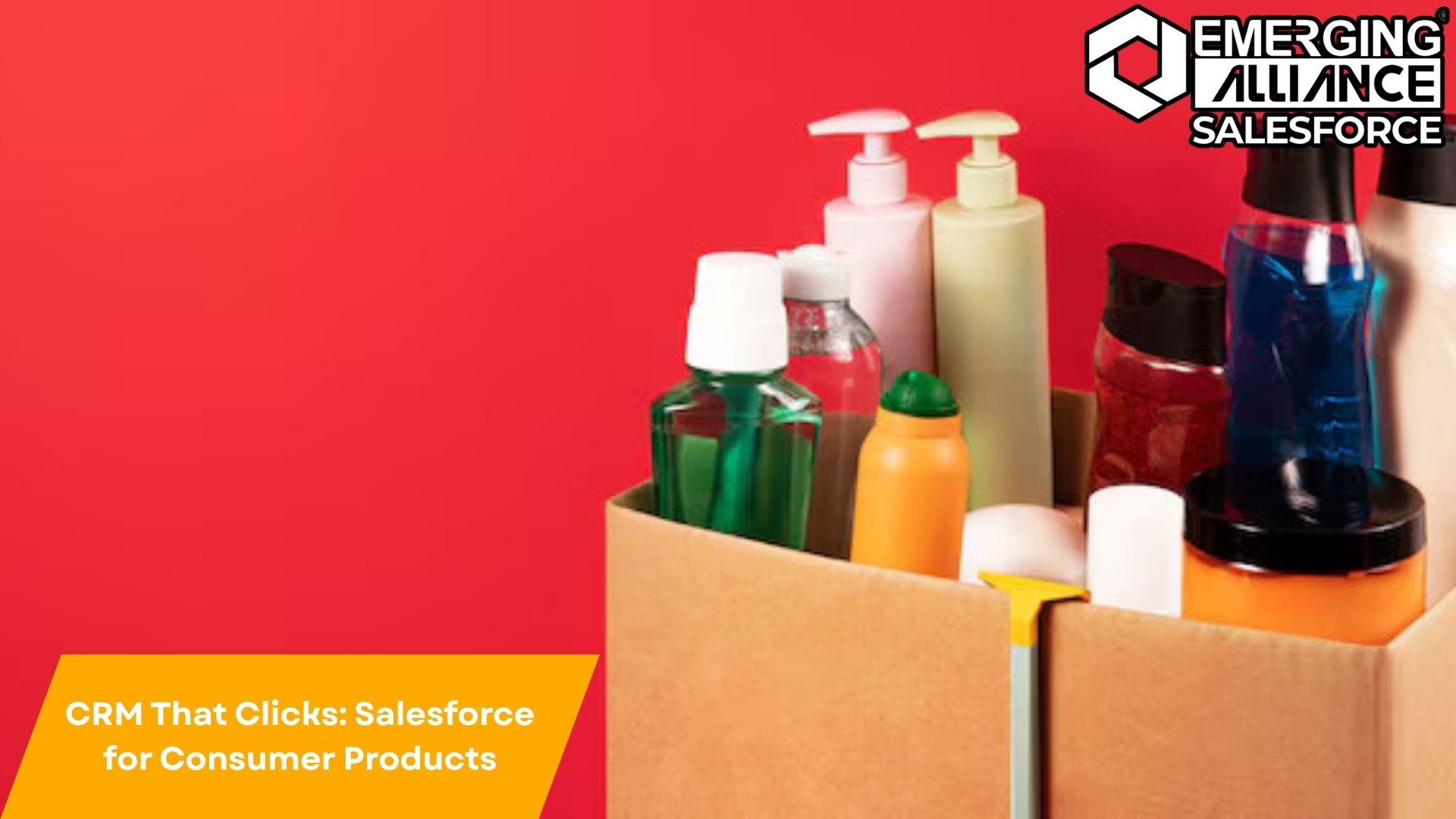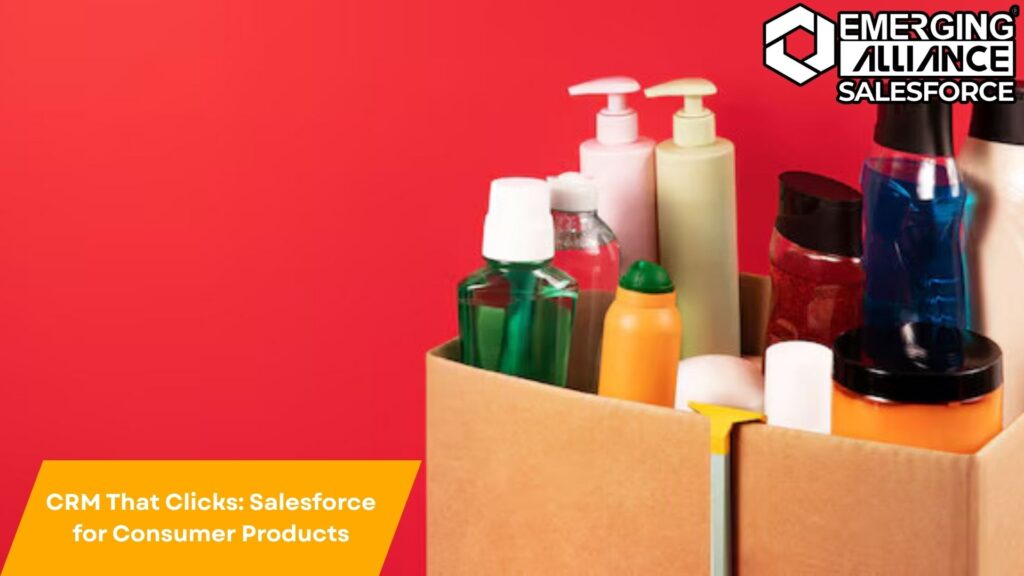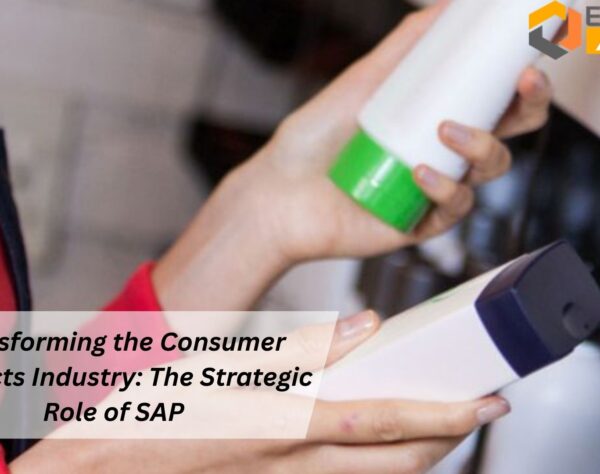
CRM That Clicks: Salesforce for Consumer Products

Turning Connections into Conversions: Salesforce CRM for Consumer Products
The consumer products industry is evolving faster than ever. With growing customer expectations, competitive pressure, and the need for personalization at scale, businesses are turning to cutting-edge tools to stay ahead. At the forefront of this transformation is Salesforce CRM, a customer relationship management platform that’s redefining how companies in the consumer products sector connect with their customers.
From improving buyer journeys to streamlining customer service and sales operations, Salesforce CRM empowers businesses with the insights and tools needed to succeed in a digitally connected market. Let’s explore how this powerful CRM software is reshaping the future of consumer brands.
Why Consumer Products Need Salesforce CRM
The modern consumer expects seamless experiences across every channel—online, in-store, mobile, and beyond. Traditional CRM tools often fall short in meeting these demands. Here’s where Salesforce CRM stands out.
Salesforce CRM benefits for consumer products industry include:
- Unified customer data across touchpoints
- Real-time insights for personalized marketing
- Automation of routine tasks and follow-ups
- Centralized communication for sales and service teams
- Scalable solutions for growing product lines and markets
By consolidating and analyzing customer interactions, Salesforce CRM software helps brands build stronger relationships and anticipate customer needs with precision.
Key Salesforce CRM Features for Consumer Products
One of the reasons for Salesforce’s dominance in the CRM space is its robust set of features tailored for various industries, including consumer products. Let’s look at some standout Salesforce CRM features that bring exceptional value:
1. Customer 360
Gain a complete, 360-degree view of every customer—past purchases, preferences, support history, and behavior. This feature ensures tailored messaging and experiences.
2. Sales Cloud
Streamline your sales pipeline with tools for lead management, forecasting, opportunity tracking, and mobile access—making it ideal for field sales teams.
3. Service Cloud
Deliver exceptional post-purchase service with automated case routing, AI-powered chatbots, and knowledge base integration.
4. Marketing Cloud
Run personalized campaigns at scale, leverage behavioral data, and automate customer journeys for greater ROI.
5. Commerce Cloud
Provide a consistent shopping experience across digital and physical storefronts.
These Salesforce CRM features align perfectly with the operational needs of the consumer products space, where agility and personalization are essential.
The Power of Salesforce CRM Integration with Third-Party Apps
One of the most underrated strengths of Salesforce CRM software is its vast ecosystem of integrations. Through AppExchange and APIs, businesses can connect Salesforce to third-party apps that enhance its core functionality.
Salesforce CRM integration with third-party apps enables:
- Seamless ERP and inventory system syncing
- Real-time social media and review monitoring
- Marketing automation via tools like Mailchimp or HubSpot
- Advanced analytics with Tableau, Google Analytics, or Power BI
- E-commerce platform connections with Shopify, Magento, and more
These integrations extend the CRM’s capabilities, allowing consumer product brands to operate with a unified, real-time, and responsive digital backbone.
Real-World Use Cases: Salesforce CRM in Action
Several consumer product companies have leveraged Salesforce CRM to enhance operational efficiency and customer satisfaction. Here are a few notable applications:
- A global beauty brand used Salesforce CRM integration with third-party apps to merge loyalty programs with in-store data, creating a hyper-personalized loyalty engine.
- A food and beverage company implemented Salesforce CRM features to track product launches, monitor customer sentiment online, and adjust marketing strategies in real time.
- A leading home appliance manufacturer utilized Salesforce CRM software to manage warranties, service requests, and customer feedback—all from a single interface.
These stories highlight the adaptability of Salesforce CRM in supporting diverse business models within the consumer products landscape.
The Future of Consumer Products with Salesforce CRM
As technology continues to evolve, Salesforce CRM remains a forward-thinking solution built for agility and innovation. With ongoing updates and AI capabilities like Einstein, the platform ensures businesses can:
- Predict customer behavior
- Optimize sales efforts with intelligent recommendations
- Deliver consistent brand experiences across all channels
- Continuously improve with real-time data and analytics
With these advancements, Salesforce CRM benefits will only expand, enabling consumer product brands to remain competitive and customer-centric.
Final Thoughts
In a market where customer experience determines brand loyalty, Salesforce CRM is not just a software—it’s a strategic asset. From real-time insights and automation to seamless Salesforce CRM integration with third-party apps, Salesforce delivers unmatched value for the consumer products industry.
For businesses aiming to scale sustainably, engage smarter, and build meaningful customer relationships, Salesforce CRM software is the CRM that truly clicks.
FAQs
1. How does Salesforce CRM help consumer products brands improve customer retention?
Salesforce CRM enables personalized engagement through data-driven insights, helping brands maintain ongoing, meaningful customer interactions.
2. Can Salesforce CRM support omnichannel customer experiences?
Yes, Salesforce CRM connects data across channels like web, mobile, in-store, and social media, ensuring a unified experience.
3. What third-party apps integrate well with Salesforce CRM for consumer products?
Common integrations include Shopify, HubSpot, Tableau, Mailchimp, and inventory management platforms.
4. How do Salesforce CRM features benefit product launches?
They offer campaign management, social sentiment analysis, and customer feedback tools to fine-tune product launch strategies.
5. Is Salesforce CRM suitable for small consumer products businesses?
Yes, it scales to fit businesses of all sizes and offers tailored solutions for startups and enterprises alike.
6. How does Salesforce CRM software enhance sales forecasting?
With predictive analytics and AI tools, Salesforce improves sales forecasting accuracy and pipeline visibility.
7. Can Salesforce CRM manage customer service for consumer brands?
Absolutely. Features like Service Cloud support case management, knowledge sharing, and live chat.
8. How does Salesforce CRM help in monitoring customer feedback?
Integrated tools allow tracking of reviews, social mentions, and surveys in real time.
9. What role does automation play in Salesforce CRM for consumer products?
Automation streamlines tasks like follow-ups, email campaigns, and service alerts, freeing up teams for strategic work.
10. Can Salesforce CRM improve collaboration between marketing and sales?
Yes. Shared dashboards, data, and goals help align marketing and sales for more cohesive strategies.







